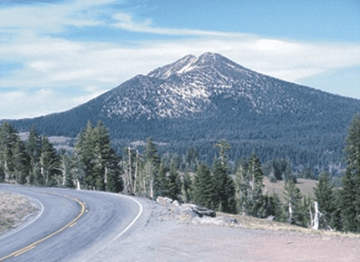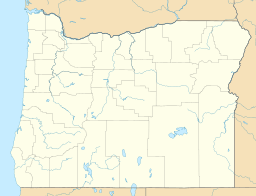Mount Scott (Klamath County, Oregon) facts for kids
Quick facts for kids Mount Scott |
|
|---|---|

Mount Scott viewed from the southwest
|
|
| Highest point | |
| Elevation | 8,934 ft (2,723 m) |
| Prominence | 3,009 ft (917 m) |
| Listing | |
| Geography | |
| State/Province | Oregon, United States |
| Parent range | Cascades |
| Topo map | USGS Crater Lake East |
| Geology | |
| Age of rock | About 420,000 years |
| Mountain type | Stratovolcano |
| Volcanic arc | Cascade Volcanic Arc |
| Last eruption | 420,000 years ago |
Mount Scott is a cool, ancient volcano located near Crater Lake in southern Oregon. It's about 420,000 years old! Imagine, it's the highest point inside Crater Lake National Park. It's also one of the tallest peaks in the Cascades in Oregon.
At the very top of Mount Scott, you'll find a small fire lookout tower. You can reach it by hiking a trail that winds its way up the mountain. The mountain got its name from an early Oregon settler, Levi Scott.
Contents
Mount Scott's Volcanic Story
Mount Scott is a type of volcano called a stratovolcano. This means it's shaped like a cone and built up by many layers of hardened lava and ash. It's also known as a parasitic cone, which means it grew on the side of a much larger volcano.
How Mount Scott Formed
Mount Scott first erupted around 420,000 years ago. This makes it one of the oldest volcanoes in the Mount Mazama complex. It mostly erupted a type of lava called andesite.
It stopped erupting a long, long time ago, during the late Pleistocene Ice Age. Mount Scott was far enough away from Mount Mazama. This helped it survive the huge explosion of Mount Mazama that created Crater Lake around 5700 BC.
What Mount Scott is Made Of
Mount Scott stands tall at 8,934 feet (2,723 m). This makes it the highest point in Crater Lake National Park. The lower parts of the mountain are covered with ash, pumice, and loose gravel.
But if you climb higher, the top of the mountain is mostly covered with scoria. Scoria is a dark, bubbly volcanic rock.
Plants and Trees on Mount Scott
Many different kinds of plants and trees grow on the slopes of Mount Scott. It's a great place to see nature!
Common Trees
You'll find several types of trees here. These include tall Douglas firs and white pines. There are also hemlocks, whitebark pines, and lodgepole pines.
Wildflowers to Spot
The mountain is also home to beautiful wildflowers. Look for bright Indian paintbrush and penstemon. You might also see tiny forget-me-nots, wild onions, and cheerful buttercups.
Hiking the Mount Scott Trail
There's an exciting trail that leads right to the top of Mount Scott. It's a popular hike for visitors to Crater Lake National Park.
Trail Details
The trail starts from Rim Drive, a road that goes around Crater Lake. It's about 2.5 miles (4.0 km) long one way. The path has many switchbacks, which are zig-zag turns that help you climb the steep parts.
The trailhead begins at an elevation of 7,683 feet (2,342 m). From there, the trail climbs about 1,479 feet (451 m) to the summit. The very top of Mount Scott is at 8,934 feet (2,723 m).
Amazing Views from the Top
Once you reach the summit, you'll be rewarded with incredible views! You can see a stunning panorama of Crater Lake and its surroundings.
On a clear day, you can also spot other famous landmarks. These include Mount Thielsen, Diamond Peak, Mount McLoughlin, and even Mount Shasta. You can also see Upper Klamath Lake and Diamond Lake from up high.
 | Charles R. Drew |
 | Benjamin Banneker |
 | Jane C. Wright |
 | Roger Arliner Young |



